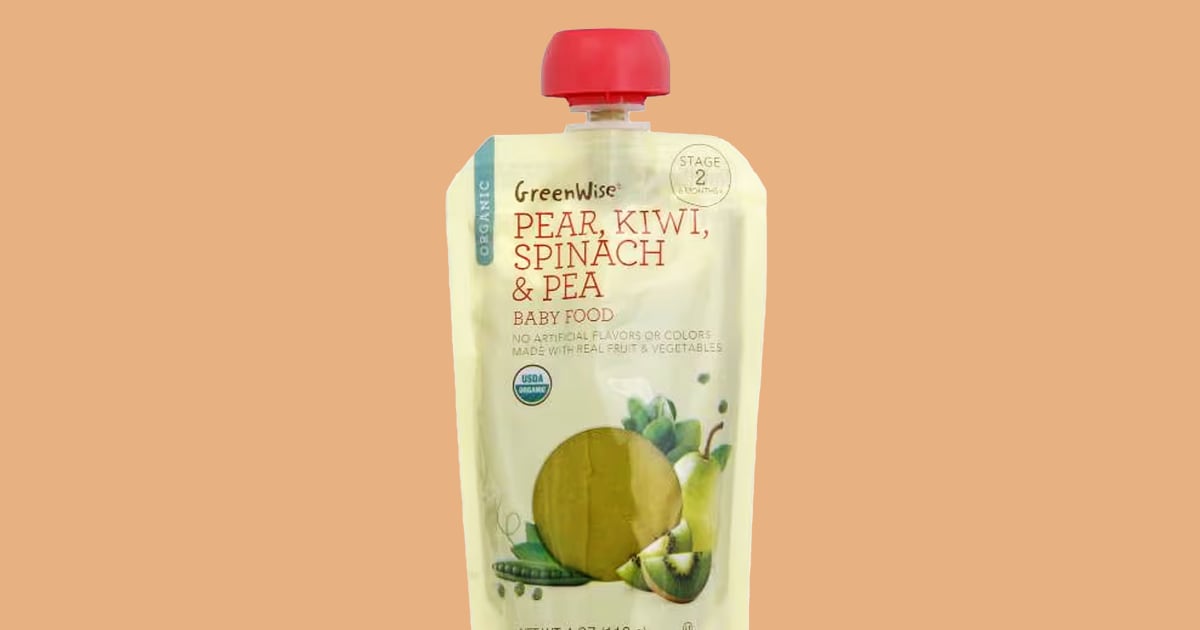Publix recalls baby food pouches over potential lead contamination

Publix, a national supermarket chain, is voluntarily recalling baby food that could be contaminated with lead, the company announced this week.
The company said it discovered the problem through routine testing and has pulled its GreenWise Pear, Kiwi, Spinach & Pea Baby Food pouches from its shelves, according to a news release, which said there were “no reported cases of illness” related to the product.
It’s the second recall of baby food for potential lead contamination in recent weeks — and in both cases, the Food and Drug Administration didn’t issue its own news release to warn the public, which safety experts and advocates said surprised them.
The FDA did not explain why it hadn’t issued a news release for the Publix recall or Target’s voluntary recall in March of its Good & Gather Baby Pea, Zucchini, Kale & Thyme Vegetable baby food puree. In that case, the FDA posted details about the recall in the agency’s public recall-monitoring database.
“The FDA is committed to ensuring that all necessary information regarding product recalls is promptly communicated to protect public health,” the agency said in a statement.
Publix did not respond to a request for comment. Target said that its Good & Gather recall “involved a limited amount of product, which we took immediate action to remove from our shelves.”
The recalls come amid heightened concern about contaminated baby food, following the 2023 recall of apple cinnamon puree pouches for children that had elevated levels of lead. And they’re also occurring as the Trump administration pledges to make baby food safer through increased testing, though some safety advocates say those promises are undermined by the deep staffing and funding cuts to federal health agencies.
Do you have a news tip you’d like to share about food safety or outbreaks of foodborne illness? You can message Suzy Khimm on Signal: SuzyKhimm.42 or contact NBC News securely here.
The FDA does not issue news releases for all food recalls, but it generally does so in cases where it determines there is a serious risk to public health, food safety experts and advocates said. Last year, the FDA issued news releases for multiple recalls of lead-contaminated cinnamon.
Sarah Sorscher, director of regulatory affairs at the Center for Science in the Public Interest, an advocacy group, said it was “concerning” that the FDA had chosen not to publicize the two recent recalls, given the serious health risk that lead poses to babies and young children, including brain damage, slower development and behavioral problems.
“There is no safe level of lead,” Sorscher noted. The FDA amplifying a recall can help reach more consumers, she added, especially for products like baby food that can have a long shelf life. “It increases the attention that stores and consumers give it, so that it’s more likely to be pulled off the shelf,” she said.
Lead contamination can happen during the manufacturing process, but it can also occur through contaminated soil used to grow produce.
In January, in the final weeks of the Biden administration, the FDA created a maximum level for lead in baby food for the first time. Though the standard is voluntary, it has helped push baby food companies to conduct more testing and initiate recalls, food safety experts and advocates said.
“Industry is taking that guidance to heart and being more proactive,” said Jennifer van de Ligt, a baby food expert who was among the FDA scientists laid off in recent weeks. “If that guidance stays in place, it should put pressure on industry to comply.”
The Trump administration has launched a high-profile effort to make infant formula and baby food safer under Operation Stork Speed. The administration said in March that the program would include “increasing testing for heavy metals and other contaminants in infant formula and other foods children consume.“
The FDA has not provided details about this increased testing and, when asked this week, instead pointed to its new effort to review nutrients in baby formula. Meanwhile, food safety advocates and former agency staff members have raised concerns about the impact of the Trump administration’s mass layoffs on food safety issues like lead contamination.
In April, the agency shuttered a federal laboratory that specialized in testing food for lead and other heavy metals and terminated its staff members, only to backtrack weeks later. The FDA also stalled in publicizing food safety warnings after terminating communications and public records staff, sources said.
The administration additionally fired federal experts for the Centers for Disease Control and Prevention who worked to prevent lead poisoning in children and proposed eliminating the lead poisoning prevention program in a leaked budget draft. In a statement, a CDC spokesperson said the agency reorganization plans were being finalized but that “the work of this program will continue.”
Sorscher argued that there was a contradiction between the administration’s stated support for baby food safety and many of its actions. “There is what they’re saying they want to do to clean up the food supply, and what they’re actually doing,” she said.
